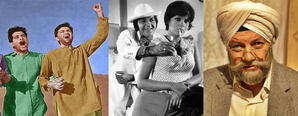New Delhi: His lecherous look, his salacious sneer, and a voice that could range from silken menace to wheedling entreaty were all he needed and no woman his sly stare fell on was safe. With the depredations he committed on-screen, Prem Chopra just had to say his name to establish his notoriety.
In “Bobby” (1973), where Raj Kapoor got him to play a cameo but did not reveal its exact contours, Chopra was dismayed to find that he had just had one dialogue – of half a dozen words.
However, those six words – “Prem naam hai mera, Prem Chopra”, as he clutched the arm of the runaway nubile heroine – made him immortal in Indian films and popular culture. As Chopra recalled in his first-person biography, the dialogue “that I had been unhappy with had made me a brand for life. Overnight it became my trademark, synonymous with me”.
Over three decades later, it resurfaced in Bollywood – delivered by Ranbir Kapoor in “Ajab Prem Ki Ghazab Kahani”, Ajay Devgn in “All the Best: Fun Begins” (both 2009) and Chopra delivered it again in a flashback sequence in “Golmaal 3” (2010).
And in his heyday, Chopra, who turns 89 on this day (September 23), once made the headlines for delaying a Delhi-bound train – due to the same dialogue.
As he recalls, he was returning the Delhi from Dalhousie after shooting for “Kala Sona” (1975) by train, “when the train ticket (TT) inspector and the rest of the staff recognised me” and “must have informed the railway authorities ahead that I was on the train because when we reached the station there was a huge gathering clamouring for me”.
“The TT requested me to come out and wave to the public. When I stepped out, the only thing they wanted of me was to say that one line…The train stopped at every station till we reached Delhi, and I repeated the performance at each stop. The next day the headline in a Delhi newspaper read that the train from Dalhousie to Delhi had been delayed by an hour because of Prem Chopra.”
But, Chopra, who like many other star-struck youths, had dreams of becoming a hero, capitalising on his rakish looks, fair complexion, and acting experience in theatre, found destiny had another pathway for him.
After his first foray into the Bombay film world fizzled out in 1955, he returned in 1960 and did become a hero – in Punjabi film “Chaudhary Karnail Singh” (1960) but never got a big break. Meanwhile, on his father’s advice, he looked for a job and eventually landed up as a supervisor in the Times of India’s circulation department, responsible for eastern India.
It seemed his luck was changing when legendary director Mehboob Khan offered him a key role in his next film but it got stuck due to his illness. In the meantime, Chopra accepted a negative role in “Woh Kaun Thi” (1964) and the supernatural-tinged thriller’s success sealed his fate.
An angry Mehboob Khan told him that he had been impatient and would always remain a villain. However, a major studio chief’s aide asked Chopra if he wanted to be a popular actor, make money, and have a house and a car. As he said yes to all three questions, the actor was advised to forget his hero ambitions and remain a villain.
He took the advice and flourished, getting to play fast and loose – or worse – with Hema Malini, Nutan, Asha Parekh, Sadhana, Saira Bano, Sharmila Tagore, Dimple Kapadia, Zeenat Aman, and Rekha and others. On the other hand, it also meant he was thumped by every male star of his times – Manoj Kumar, Sunil Dutt, Dilip Kumar, Dev Anand, Rajendra Kumar, Shammi Kapoor, Shashi Kapoor, Dharmendra, Rajesh Khanna, Amitabh Bachchan, Jeetendra, Rajinikanth, Rishi Kapoor…
Positive roles as Raja Porus’ valorous younger son in “Sikander-e-Azam” and intrepid revolutionary Sukhdev in “Shaheed” (1965) were eclipsed by the heartless lover of “Kati Patang” (1970) or wayward Westernised brat Omkara of “Purab Aur Paschim” (1970), criminal mastermind Drona in “Hare Raama Hare Krishna” (1971), Shambhu Singh of “Kranti” (1981), the scheming businessman of “Trishul” (1978) or “Dostana” (1980), money-minded mine owner Seth Dhanraj in “Kala Patthar” (1979) and more.
However, sometime in the early 1990s, he grew tired of getting beaten up and followed predecessors like Pran into character roles. The truck driver in “Bunty and Babli” (2005), the grandfather in “Rocket Singh” (2009), and the mafia don in “Agent Vinod” (2012) are some examples.
Having the unique record of working with the entire Kapoor family across four generations – from Prithviraj to Kareena and Ranbir, and both generations of Bachchans, Dutts, Deols, and both Khannas (Rajesh and Vinod), Chopra is still to bid adieu to the camera.
(Vikas Datta can be contacted at vikas.d@ians.in)
–IANS


Comments are closed, but trackbacks and pingbacks are open.